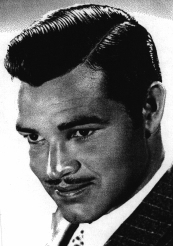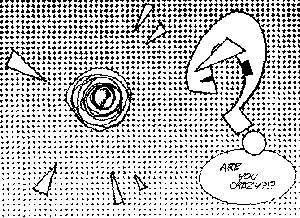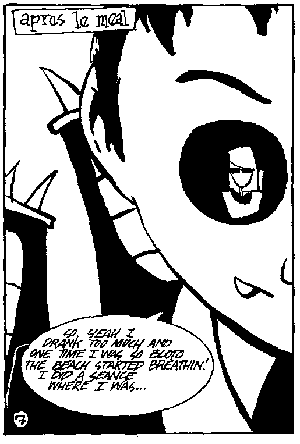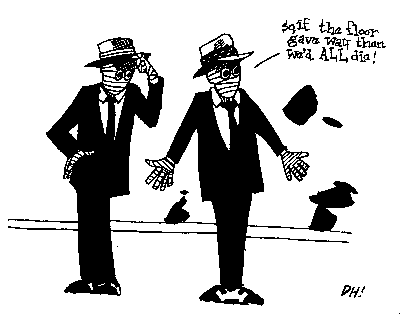Several years ago in a small comic book store in Houston, TX, I ran across a couple of issues of a self published comic book called Horse, created by Dylan Williams. They were mind blowingly great...at least in my opinion. They seem like bits and pieces of some surreal story spliced together; they're pretty hard to follow and real ambiguous, but I guess that's the beauty of them. What really drew me to them, though, was perspective. Have you ever noticed how many different perspectives a good film maker uses in a movie? If you watch for it, you will see what I'm talking about. I have never seen anything like it in comic books until I saw Dylan's work (or at least I've never seen it quite so well done). He created a total of five issues of Horse before he moved on to his other comics. He has put out two issues of Crime Clinic (a true crime comic), two issues of Reporter, and tons of Hey Granpa! comic strips. He was living in the San Francisco area when he made Horse and had since moved. I finally caught up with him through the mail in Olympia, Washington. The following is from two subsequent mail interviews.
 |
| Dylan Williams' press photo. |
S.C.:What comic book artists have influenced you the
most?Where are your roots?
DW: I am a gigantic comic nerd. Influenced by Jack Cole, Herge, Roy Crane
and Ozamu Tezuka. Jack Cole is my "favorite". He drew Plastic
Man in the 40s. My favorite comics by him (and of all) are the 2 issues
of True Crime he did in the early 50's. There are reprints of these done
in the 80's. My roots... I read every comic and book I could get my hands
on as a kid. I tend not to be influenced by modern comics/comic artists
but there are some I like to read: Nowhere, Acme Novelty Library, Peepshow,
Dirty Plotte, Lust for Life and Usagi Yojimbo. I've always loved movies,
music, and fine art (liberal/arty parents).
What drives you to create? This is an ambiguous question
to me, and I wonder what it is that pushes other people to invent stories,
pictures, music, etc.
I love to tell stories...from a psychological point it's simply that I
like being the center of attention. I think this is truly what drives
most artists. Otherwise, why not just read?
 |
Do you have any defined purpose with your art, or
is it more just an uncontrollable creative drive?
My purpose in doing art is to communicate a specific point to the reader.
To inspire, console or challenge the reader in regards to that point.
Have you had any type of formal schooling past high
school?
I've gone to college but have no degree. I mostly took any and all art/writing/art
history classes. I also sought out independent art/comic classes taught
by professionals.
How long have you been drawing and when was the first
time you created a "complete" story -- complete enough to call
it a "book"?
I was drawing when I was 4. I was doing comics when I was 16 and did my
first mini/self-published comic when I was 18.
Are comics the only artform that you work in?
Yeah, I'm pretty much only doing comics now. I wirte some prose on my
own. I draw/sketch as much as I can. I've tried photography, film, sculpture,
painting, graffiti and a few other things.
Is there anything that you feel an unknowledgable
(of comics) public should know about your artform?
Like you say, it's an artform. It has (should have) a muse and has possibilities
and limitations just like all other artforms. It has a rich history.
What do you feel is the importance of comic book art
in this society?
Comics offer an intimacy, a personal voice that is impossible in most
other artforms.
 |
Other than Hey Granpa, most of your stories are very
ambiguous and seem rooted in human psychology. I get this impression primarily
from the deliberate pace of the stories and the detail that you include
in certain moments. How aware are you of your utilization of the human
psyche and what drew you to telling stories in this style?
I am inalterably deliberate in everything I do and so I try and counter
this by not analyzing the psychology of my characters or stories. I guess
you could say that I don't know why my serious stories are the way they
are but they are that way for a reason.
Hey Granpa! is in an obviously different style from
any other comic that I've seen of yours...it seems a lot more palatable
to the general public. Is this for more commercial reasons or simply a
different personal style? Please elaborate on how you ended up doing Hey
Granpa!.
Originally Hey Granpa was a parody of strips like Blondie and Hi & Lois.
As I did some more I developed my own take on newspaper strips. Hey Granpa
is really a side of my character (both the curmudgeon and the "square"
or sitcom humor). Some of my favorite humor is stuff where you are laughing
at the person who wrote it for even thinking that would be funny. Also
there is a bit of that Charlie Chaplin kind of humor in it where you as
the viewer are laughing at something that is so tragic for the participants.
Hey Granpa is all kinds of things to me. There's a side of me that wishes
/dreams about Hey Granpa pillow cases and ads for Met Life. Obviously
that's just a fantasy for now.
Do you have a specific audience in mind when you create
your comic books?
I do my comics for people I respect and myself. I hate being talked down
to so I try not to do it.
To what extent are your comic books autobiographical?
As much as any work of fictions is... if you want to look hard enough.
My stuff doesn't document specific events in my life ever.
What the heck are those bandage guys? Is it some bizarre
connection to the Invisible Man?
I try and approach my serious comics as if they were a dream. Things pop
up for all kinds of reasons in dreams. I think the bandage guys are there
as icons, as a fear of the unknown/uncertainty, and a comic device. What
I mean by that last bit is that all the creepy stuff they do creates a
tension around them that sets them up for jokes...ie, they are straight
men. In Reporter they become Adam's muse as well as all the other things.
How do yo feel about being printed and distributed
by an actual comic book company versus the underground handmade format
that you've used in the past?
I think that the work is still the same no matter how it is published
or who fronts the bill. I don't think that anyone but the artist should
own work, of course. I used to worship at the alter of self publishing.
I still respect it way more but I think the message is more important
than the messenger.
You said that Reporter came out in December, do you
know which comic book stores are picking it up?
Orders weren't great for Reporter and now that it is so late in shipping,
I have a feeling that some stores will return their copies before putting
it on their shelves. People can order it directly from me. And, boy ,
am I looking for another publisher now!
 |
Other than Reporter, are you currently working on
any projects?
I am only doing Reporter and Hey Granpa. Reporter is a long sprawling
story of the people in the town of Willoughby and so gives me a chance
to do all the dramatic stuff I want to. There will be a self published
package of Reporter stories within the next month. I am working on a couple
of real crazy Hey Granpa things.
How do you feel about the current state of the comic
book industry? What do you like about it, and what would you like to see
change?
I think a new variety of readers and creators is slowly making people
do "better" comics. It's getting rid of the silly idea that
there is only one or two kinds of comics...it's a medium! I think people
"in" comics have an inferiority complex about this wonderful
artform...kind of like people in film had until the 30's or 40's. People
also need to read about their history and find out about all the great
comics that have come before. It's always struck me as strange that comics
people only know about 20 years of history. In literature it is expected
that you know about Shakespeare, Melville and Homer. You don't have to
like it but, if you're a writer, you've at least read it.
You said that you are also influenced by movies, music,
and fine art? What sort of movies, etc. do you enjoy?
In art I like Kathe Kollwitz and Marcel Duchamp. In film Jean Cocteau,
David Lean and Howard Hawks. I also like a camera man named John Alton
a lot. In writing Melville, Charles Willeford and (recently) H.L. Mencken.
In music Thelonius Monk, the Beatles, Hank Williams, Nas, Debussy, The
Smiths...it goes on. I like a bunch of illustrators and designers like
Saul Bass and Rockwell Kent. I wish I knew more about photographers and
sculptors. Performance art is not high on my list of likes and I think
most fine art has just become the craft that it was trying to escape...that
doesn't mean it's bad though.
Why did you move to Olympia?
I moved to Olympia 'cause I needed a change after living in the Bay Area
for 10 years and my girlfriend's family is from Washington. We are going
to be moving again in the next year or so.
What can you tell me about Filthy Habits from Aeon...
Filthy Habits was published by Aeon and has moved to Slave Labor and changed
it's name to X-Ray Comics. It's a great comic (they have a character with
my name). The two guys who do it (Landry Walkes and Eric Jones) also do
a strip called X-Ray for Bam magazine. Their comic is great.
Are you able to support yourself with your comics?
Not yet, but I manage to live cheap.
What would you suggest to young aspiring comic book
creators?
Think more, draw less.